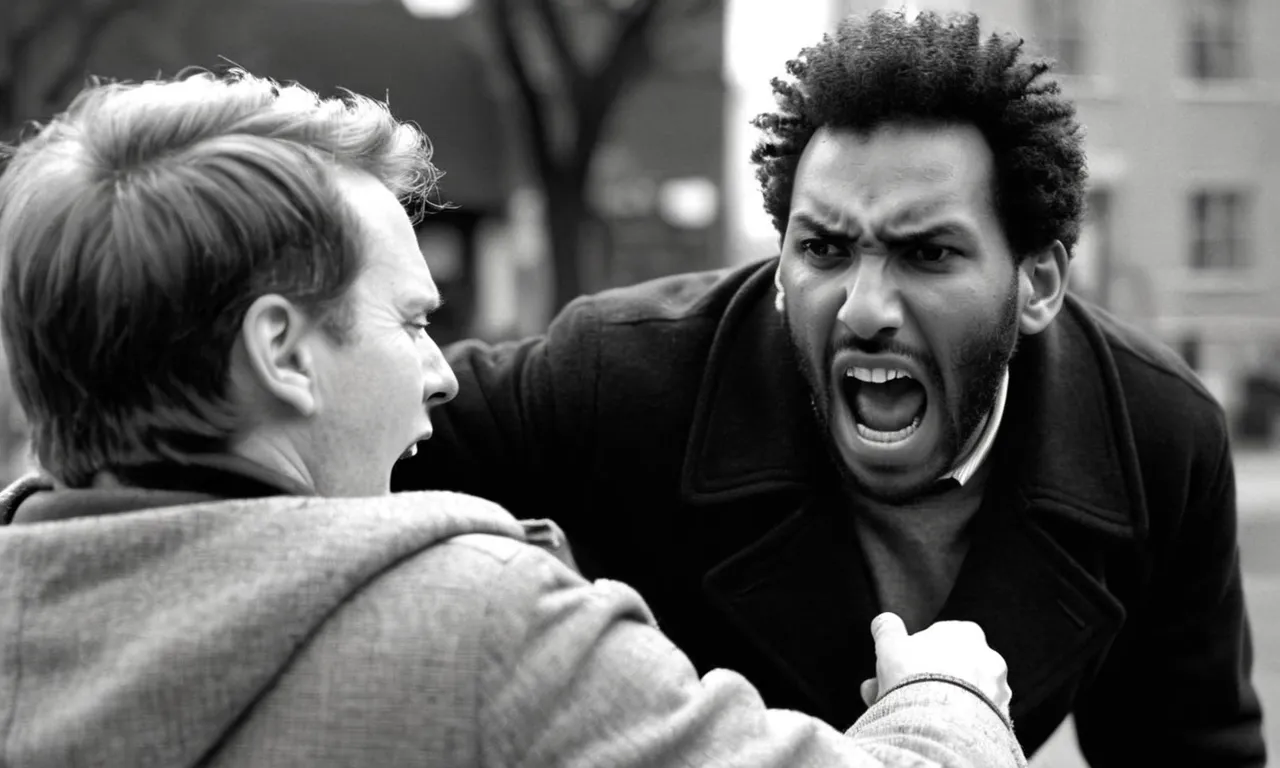When A Man Hates Himself, He Takes It Out On The Woman Who Loves Him: Meaning And Insights
In the complex realm of human relationships, the phrase ‘when a man hates himself, he takes it out on the woman who loves him’ carries a profound and unsettling truth. This statement encapsulates the intricate interplay between self-loathing, emotional turmoil, and the potential for destructive behavior within intimate partnerships.
If you’re short on time, here’s a quick answer to your question: When a man harbors deep-seated feelings of self-hatred or low self-worth, he may unconsciously project those negative emotions onto the woman who loves him, leading to emotional or even physical abuse.
This behavior stems from an inability to confront and resolve his internal conflicts, resulting in the displacement of pain onto his partner.
In this comprehensive article, we will delve into the psychological underpinnings of this phenomenon, exploring the root causes, manifestations, and potential consequences. We will also examine strategies for breaking this cycle and fostering healthier relationships built on mutual respect and understanding.
The Psychology of Self-Hatred
Understanding Self-Loathing and Its Origins
Self-hatred, also known as self-loathing, is a complex psychological phenomenon that can have profound effects on an individual’s well-being and relationships. At its core, self-hatred is a deep-seated negative perception of oneself, often rooted in feelings of inadequacy, worthlessness, and a lack of self-acceptance.
This inner turmoil can manifest in various ways, from self-sabotaging behaviors to difficulty forming healthy connections with others.
According to the American Psychological Association (https://www.apa.org/), self-hatred can stem from a variety of factors, including childhood experiences, trauma, societal pressures, and unrealistic expectations.
It’s often a byproduct of negative self-talk and internalized criticism, which can become a self-perpetuating cycle that’s difficult to break free from without professional help or a strong support system.
The Impact of Childhood Experiences and Trauma
Childhood experiences play a pivotal role in shaping an individual’s self-perception and self-worth. According to a study published in the Journal of Interpersonal Violence, individuals who experienced emotional or physical abuse during childhood were more likely to develop self-hatred and low self-esteem later in life.
Additionally, traumatic events, such as neglect, abandonment, or witnessing domestic violence, can leave lasting scars and contribute to the development of self-loathing tendencies.
Experts at the National Child Traumatic Stress Network (https://www.nctsn.org/) emphasize the importance of addressing childhood trauma and providing support to individuals who have experienced adverse experiences.
Failure to do so can lead to a perpetuation of negative self-beliefs and a heightened risk of mental health issues, such as depression and anxiety.
Societal Pressures and Unrealistic Expectations
In today’s society, individuals are bombarded with unrealistic expectations and societal pressures that can fuel self-hatred. The media, for instance, often perpetuates idealized standards of beauty, success, and perfection that are unattainable for most people.
According to a study by the American Psychological Association, exposure to these unrealistic standards can contribute to body dissatisfaction, low self-esteem, and negative self-perceptions, particularly among women and young adults.
Moreover, societal expectations surrounding gender roles, career success, and personal achievements can create immense pressure on individuals, leading them to feel inadequate or like they don’t measure up.
A survey conducted by the American Psychological Association found that nearly 60% of adults reported feeling pressure to achieve unrealistic standards of success, which can breed self-hatred and a sense of failure.
It’s crucial to recognize the harmful effects of societal pressures and unrealistic expectations, and to cultivate a more accepting and compassionate mindset towards oneself. By challenging these societal norms and embracing self-acceptance, individuals can begin to break free from the chains of self-hatred and cultivate a healthier, more positive self-perception.
😊
Projection and Displacement: The Mechanisms at Play
The Role of Defense Mechanisms
When a man harbors deep-seated feelings of self-hatred or low self-worth, his psyche often employs defense mechanisms to protect him from the painful emotions associated with these negative self-perceptions.
One such mechanism is projection, where an individual attributes their own unacceptable thoughts, feelings, or behaviors onto others. According to the American Psychological Association (https://www.apa.org/topics/defense-mechanisms), projection is a common defense mechanism used to avoid uncomfortable feelings or impulses.
By projecting his self-loathing onto his partner, the man can unconsciously distance himself from these undesirable aspects of his psyche.
Emotional Transference and Scapegoating
Closely related to projection is the phenomenon of emotional transference, where emotions or attitudes originally associated with one person or situation are redirected toward another. In this case, the man’s negative emotions stemming from his self-hatred are displaced onto his partner, who becomes a convenient target or scapegoat.
This scapegoating behavior can manifest in various forms, such as verbal abuse, emotional manipulation, or even physical violence. According to a study by the National Domestic Violence Hotline (https://www.thehotline.org/resources/statistics/), 1 in 4 women and 1 in 9 men experience severe intimate partner physical violence, intimate partner sexual violence, and/or intimate partner stalking with impacts such as injury, fearfulness, post-traumatic stress disorder, use of victim services, contraction of sexually transmitted diseases, etc.
The Cycle of Abuse and Victimization
Unfortunately, this pattern of projection and displacement can perpetuate a vicious cycle of abuse and victimization. As the man continues to project his self-hatred onto his partner, the emotional and psychological damage inflicted can reinforce his partner’s sense of worthlessness or self-blame.
This, in turn, can make them more vulnerable to further abuse, creating a self-fulfilling prophecy. According to the National Coalition Against Domestic Violence (https://ncadv.org/STATISTICS), on average, nearly 20 people per minute are physically abused by an intimate partner in the United States.
During one year, this equates to more than 10 million women and men. Breaking this cycle requires a combination of personal growth, emotional healing, and professional intervention to address the underlying issues of self-hatred and unhealthy coping mechanisms.
Manifestations of Self-Hatred in Relationships
When an individual harbors deep-rooted feelings of self-hatred, it can manifest in destructive ways within their relationships. This internal turmoil often spills over, leading to various forms of abuse and manipulation towards their partner.
The following are some common manifestations of self-hatred in relationships:
Emotional Abuse and Manipulation
Individuals struggling with self-hatred may resort to emotional abuse and manipulation as a means of exerting control and deflecting their own insecurities. This can take the form of verbal insults, constant criticism, gaslighting, and emotional blackmail.
According to a study by the National Center for Biotechnology Information, emotional abuse is a significant predictor of mental health issues, including depression and anxiety, in victims. Emotional abusers may also exhibit jealous or possessive behavior, isolating their partners from friends and family.
Physical Abuse and Domestic Violence
In extreme cases, self-hatred can manifest as physical abuse and domestic violence towards a partner. This can range from pushing, slapping, or hitting to more severe forms of violence. According to the National Coalition Against Domestic Violence, on average, nearly 20 people per minute are physically abused by an intimate partner in the United States.
Physical abuse often stems from a deep-seated desire to assert power and control, fueled by an individual’s own feelings of inadequacy and self-loathing.
Gaslighting and Undermining Self-Esteem
Gaslighting is a form of psychological manipulation where an abuser consistently denies or distorts reality, causing the victim to question their own perception and sanity. This tactic is often employed by individuals with self-hatred as a means of undermining their partner’s self-esteem and making them feel inadequate or “crazy.”
According to a study by the American Psychological Association, gaslighting can have severe long-term effects on a victim’s mental health, including increased anxiety, depression, and even post-traumatic stress disorder (PTSD).
It’s important to recognize these manifestations of self-hatred in relationships and seek professional help or support from trusted sources. No one deserves to be subjected to abuse or manipulation, regardless of the underlying causes.
With awareness and appropriate intervention, individuals can work towards healing their self-hatred and fostering healthier, more fulfilling relationships.
Breaking the Cycle: Strategies for Healing and Growth
Seeking Professional Help and Therapy
Recognizing the need for professional support is a crucial step in breaking the cycle of self-hatred and its impact on relationships. Therapy can provide a safe and non-judgmental space to explore the root causes of negative self-perceptions and develop healthy coping mechanisms.
According to a study by the American Psychological Association, individuals who seek therapy are more likely to experience improvements in their mental health, relationships, and overall well-being. Don’t hesitate to reach out to a licensed therapist or counselor who specializes in issues related to self-esteem, trauma, and interpersonal relationships.
Developing Self-Awareness and Emotional Intelligence
Cultivating self-awareness and emotional intelligence is essential for understanding and managing one’s emotions and behaviors. Through self-reflection and mindfulness practices, individuals can gain insights into their thought patterns, triggers, and emotional responses.
This self-awareness can empower them to make conscious choices and develop healthier coping strategies. According to a study by the Emotional Intelligence Consortium, individuals with higher emotional intelligence tend to have better relationships, better mental health, and higher job performance. Consider exploring resources such as books, workshops, or online courses that focus on emotional intelligence and self-awareness.
Building a Support System and Healthy Boundaries
Surrounding oneself with a supportive network of family, friends, or support groups can play a vital role in the healing process. These individuals can offer encouragement, perspective, and a safe space to share experiences without judgment.
Additionally, establishing healthy boundaries is crucial for maintaining a sense of self-worth and preventing further emotional harm. This may involve setting limits on behaviors that are harmful or disrespectful, and learning to prioritize one’s own needs and well-being.
According to a study by NIH, individuals with strong social support systems tend to have better mental health outcomes and are more resilient in the face of adversity. Don’t be afraid to reach out and build a network of supportive individuals who can uplift and encourage you on your journey to healing and growth.
Breaking the cycle of self-hatred and its impact on relationships is a journey that requires patience, self-compassion, and a commitment to personal growth. By seeking professional help, developing self-awareness and emotional intelligence, and building a supportive network, individuals can begin to heal and cultivate healthier relationships with themselves and others.
Remember, you are worthy of love and respect, and with the right tools and support, you can overcome the challenges and embrace a life of fulfillment and joy. 😊🌟
Fostering Healthy Relationships: A Path Forward
Cultivating Self-Love and Self-Acceptance
The journey towards fostering healthy relationships begins with cultivating self-love and self-acceptance. When individuals harbor negative emotions and self-loathing, it can manifest in destructive behaviors that harm not only themselves but also their loved ones.
According to a study by the American Psychological Association, individuals with low self-esteem are more likely to exhibit patterns of emotional abuse and control within their relationships. Therefore, it is crucial to develop self-compassion and embrace one’s flaws and imperfections.
This can be achieved through practices such as mindfulness, positive self-talk, and surrounding oneself with supportive individuals who uplift and encourage personal growth.
As Dr. Kristin Neff, a renowned expert on self-compassion, states, “Self-compassion involves treating ourselves kindly, like we would a good friend we cared about.” 😊 By embracing this mindset, individuals can break free from the cycle of self-hatred and cultivate healthier relationships built on mutual understanding and respect.
Effective Communication and Conflict Resolution
Effective communication and conflict resolution are vital components of any successful relationship. When individuals struggle with self-hatred, it can lead to communication breakdowns and an inability to resolve conflicts constructively.
According to The Gottman Institute, couples who exhibit contempt, criticism, defensiveness, and stonewalling (known as the “Four Horsemen of the Apocalypse”) are more likely to experience relationship dissatisfaction and dissolution.
To foster healthy communication, it is essential to practice active listening, express emotions openly and respectfully, and approach conflicts with a problem-solving mindset rather than attacking one’s partner.
Couples counseling or seeking guidance from relationship experts can provide valuable tools and techniques for improving communication and conflict resolution skills. As the saying goes, “Great minds discuss ideas; average minds discuss events; small minds discuss people.”
👏 By focusing on open and honest dialogue, couples can navigate challenges and strengthen their bond.
Mutual Respect, Trust, and Empathy
Mutual respect, trust, and empathy are the cornerstones of any healthy relationship. When individuals struggle with self-hatred, it can lead to a lack of respect for their partner, a breakdown of trust, and an inability to empathize with their partner’s perspectives and emotions.
According to a study by the American Psychological Association, couples who exhibit high levels of empathy and emotional intelligence are more likely to experience greater relationship satisfaction and longevity.
To cultivate mutual respect, trust, and empathy, it is essential to:
- Value each other’s individuality and differences
- Engage in open and honest communication
- Make an effort to understand each other’s perspectives and emotions
- Celebrate each other’s successes and support each other’s growth
By embracing these principles, couples can create a safe and nurturing environment where both partners feel valued, respected, and understood. As the famous quote goes, “Love is not just looking at each other, it’s looking in the same direction.”
😍 When couples work together, support each other, and foster mutual respect, trust, and empathy, they can overcome the challenges posed by self-hatred and build a lasting, fulfilling relationship.
Conclusion
The statement ‘when a man hates himself, he takes it out on the woman who loves him’ sheds light on a complex and often overlooked dynamic in relationships. Self-hatred, rooted in various psychological and societal factors, can manifest in destructive behaviors that harm not only the individual but also their loved ones.
By understanding the mechanisms at play, such as projection, displacement, and emotional transference, we can better recognize the signs and take proactive steps to break this cycle. Seeking professional help, developing self-awareness, and building a supportive network are crucial steps in the healing process.
Ultimately, fostering healthy relationships requires a commitment to self-love, effective communication, mutual respect, and empathy. Only by addressing the underlying issues of self-hatred can individuals truly embrace the transformative power of love and create fulfilling, nurturing partnerships built on a foundation of trust and understanding.








